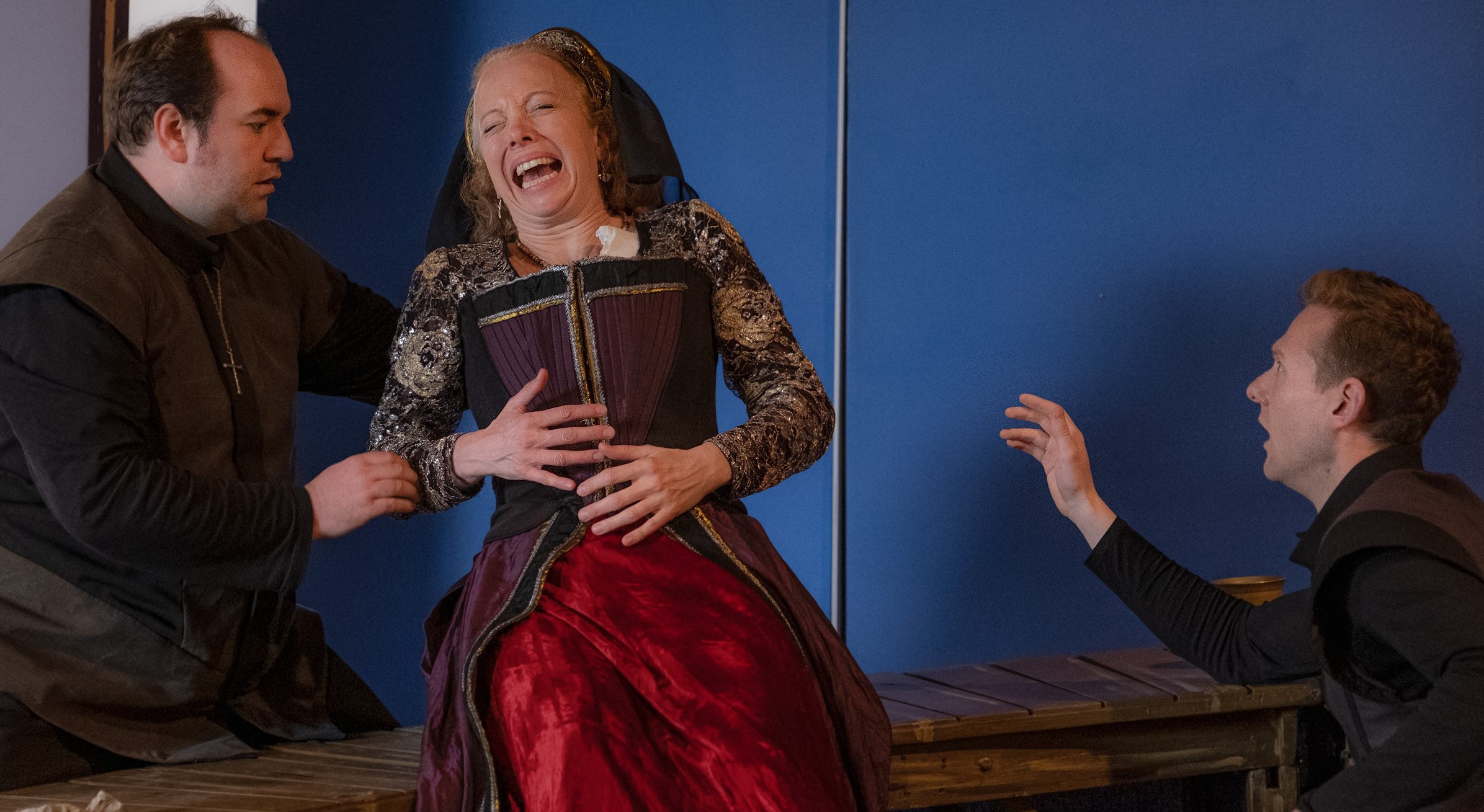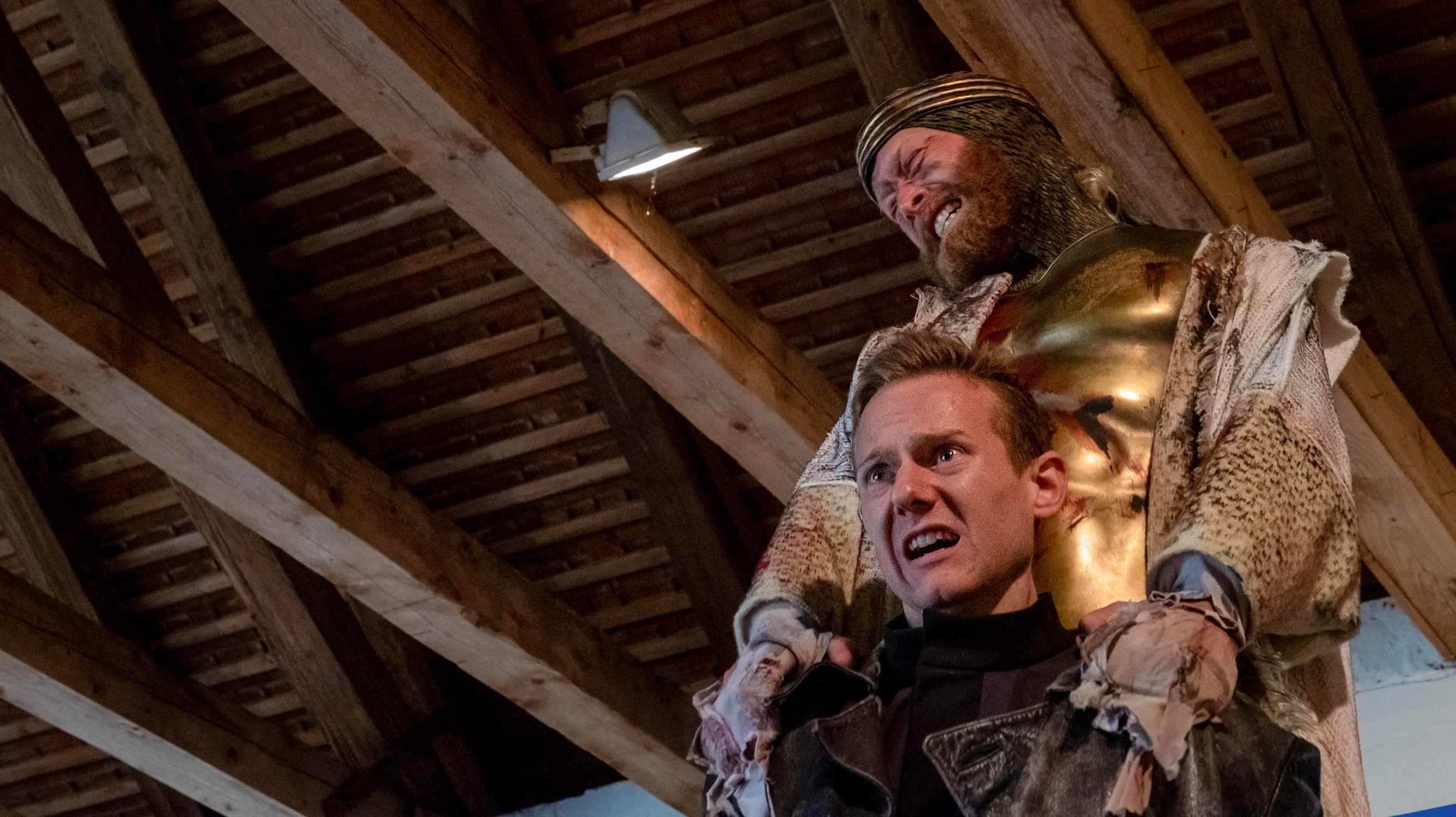- Daily & Weekly newsletters
- Buy & download The Bulletin
- Comment on our articles
Hamlet ‘invents the modern human’: Shakespeare performed at Groot-Bijgaarden Castle
Hamlet takes place in a castle, but have you ever seen it performed at a castle? Now you have the chance as one of Shakespeare’s most famous plays – and many would argue the most significant – is being performed in English on the grounds of Groot-Bijgaarden Castle.
Groot-Bijgaarden is a district of Dilbeek and just a few kilometres outside of Brussels. The castle is not open to the public, but many people know it from the Floralia Brussels, which takes place on the grounds every spring.
The play is being performed on Thursday, 23 September, on those same grounds. British company TNT Theatre, which tours the world, have developed a special stage specifically for its castle productions.
“Our set is quite clever – I can say that because I didn’t design it,” laughs Paul Stebbings, TNT’s artistic director. Where the actors are positioned on the custom built wooden half-circle suggests whether they are indoors or outdoors.

“This allows a battlement scene to very quickly change into a court scene,” explains Stebbings. “In Shakespeare’s day, there was no set, so all the scenes flowed quickly together. You go and see some big National Theatre productions, and there is this great clanking of sets, battlements come and go. That’s not what Shakespeare intended.”
TNT has been touring its productions around the world for 40 years, becoming one of the most popular touring companies in the world. It is the number one touring theatre in China, for instance, as well as Japan. It does a lot of Shakespeare, but also more contemporary works. Stebbings is in Munich now rehearsing a production of The Wave – set to come to Brussels in the winter.
The American Drama Group Europe, based in Munich, eventually began producing TNT’s plays, and now Stebbings himself is based in the German city. He in in fact one of TNT’s founders.
“One of the advantages of a long-running company like this is that we develop our productions over time,” he says. “So this Hamlet began its life 18 or 19 years ago. It hasn’t been in continuous repertoire, but it’s been revived. A couple of the actors were in younger roles before. So our Polonius was the original Horatio, for example.”
Something is rotten
In case you need a refresher course: Hamlet is the prince of Denmark, and his father, the king, has died. Hamlet’s uncle, Claudius, is now king, and Hamlet is furious that his mother, Gertrude, has married him. The ghost of Hamlet’s father appears to him to tell him that Claudius in fact murdered him and that Hamlet must avenge his death. In the meantime, Hamlet is involved in a forbidden love affair with Ophelia, whose father, Polonius, is an advisor to the court. Horatio is Hamlet’s closest friend.
We won’t drop any spoilers, but let’s just say it’s not called a tragedy for nothing. Over the years, TNT has changed its adaptation of Hamlet here and there, but one thing that hasn’t changed is that Hamlet is always staged in or outside a castle. “It takes place in a castle, so that’s just perfect,” says Stebbings.
Also, he adds, “Shakespeare benefits from that because you’re closer to the original. Shakespeare’s actors always saw their audience. Plunging the audience into darkness might allow you some nice lighting effects, but it’s not what Shakespeare intended. When Hamlet is alone on stage in a darkened auditorium, he is alone. But when he’s delivering ‘to be or not to be’ to an audience he can see, it changes how he performs it, and how the audience hears it. Why did we plunge the audience into darkness in the mid-19th century? Because we could? It’s a bit odd, isn’t it.”
TNT has eliminated some minor characters and, while the play is in the original Elizabethan English, he insists it is a simple enough story for anyone to follow. TNT “concentrates on clear storytelling,” he says. “Shakespeare is a master storyteller.”

There are famously three versions of Hamlet. The first version is the shortest, and the third version, the Folio, was published after Shakespeare’s death. This allows stage directors to dig in to different versions and mix them up a bit.
“We pillaged scenes that make more sense, including a lovely scene with Gertrude and Horatio from the earliest text. But the poetry in that first version isn’t as good, so then we go back to the second version, which is the best, in my opinion. It’s maybe not all in the order that Shakespeare intended, but it makes the clearest play and allows us to create something that the audience can understand better.”
Stebbings is convinced that Hamlet is Shakespeare’s most important play. “All of Shakespeare moves into and come out of Hamlet,” he says. “There might be better plays – Othello is better constructed, for example, and Macbeth is easier to follow – but Hamlet is the crucial one. If I’m being pretentious, I would say it invents the modern human. Hamlet is the first time in world literature that anybody really puts on stage someone deciding for themselves what’s right and wrong.”
This ground-breaking morality can be found in some of the play’s most famous lines, says Stebbings, like: “There is nothing either good nor bad but thinking makes it so”. And then there’s “to be or not to be,” the most famous soliloquy in history for its queries as to what death offers compared to life – a direct challenge to the notion of a heavenly paradise.

“Hamlet has no idea what’s going on,” says Stebbings. “It’s not an atheist play; God’s there or not there, ghosts are there or not there. He’s really not sure. Is it Catholic, is it protestant? He’s all these things all mixed together. He is as the modern human. It’s pretty clear that the reason why Hamlet is the most famous literary figure in the world is because he taps into something. And that something has to be us humans being free from gods and kings and rules and having to decide for ourselves what is right and wrong.”
While conscience appears in numerous Shakespeare plays – often too late – it appears most in Hamlet, claims Stebbings. “Conscience is us deciding what’s right and wrong, and it’s pretty crucial, really. I’m not going to open Psalms, verse 3, chapter 4 to see if what I’ve done is right. I am going to decide if it’s right. That’s what Hamlet does, and that was huge. That’s why the British writer Hilaire Belloc said famously: ‘If a person has not read or seen Hamlet, they may as well have spent their life at the bottom of a deep well’.”
Don’t spend your life at the bottom of a deep well; pick up tickets to Hamlet here. The show will take place rain or shine
23 September 14.00 & 18.00
Groot-Bijgaarden Castle
Isidoor van Beverenstraat 5, Dilbeek



















